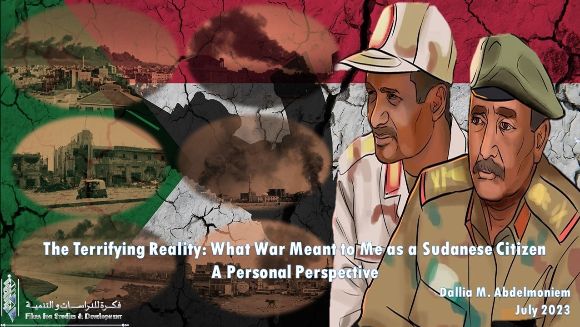The Terrifying Reality: What War Meant to Me as a Sudanese Citizen?
The Terrifying Reality: What War Meant to Me as a Sudanese Citizen?
A Personal Perspective
Dallia M. Abdelmoniem
I never thought that one day I would be forced to flee my home country because of war. Leave for other reasons maybe, but war? It never occurred to me.
For a large chunk of my adult life, I lived abroad, but I took the decision to move back in 2013 and even with all the upheavals, the economics, the politics I never once regretted it. I was back home, starting from scratch, building a life for myself, setting up a tight community, a tribe made up of family, newly formed friendships and contacts only to see all of that taken away in the blink of an eye. Ten years after landing back at Khartoum Airport I find myself in limbo and away from home and everything that I know.
No one chooses to become a refugee, stateless, or whatever the correct term that best fits my current situation is.
Like hundreds and thousands of Sudanese who were all forced to flee I’m caught between parallel universes. One in which I am physically safe and trying to function and the other where my every waking minute is spent scrolling through social media for news, updates, for any nugget of positive news about Sudan. But there is none. I live and breathe Sudan news. I can’t hold a conversation because I find myself inadvertently turning it back to being about Sudan. And not everyone wants to hear nor talk ‘Sudan’.
Very few can relate or understand what upheaval and trauma one experiences from war, from armed conflict. When in the space of minutes, you go from planning for the upcoming Eid festivities to finding a safe room in your house as the bomb blasts and artillery continue to go off and the whole house shakes like it’s made out of cardboard. When there is no electricity, no running water and food supplies are running very low, yet you can’t even take the risk of leaving and finding refuge elsewhere because you don’t know if you can.
There’s no safety in your home and no safety outside.
And throughout all of this, you have to remain calm, to think logically and smartly because it’s not just yourself that you have to think about there are others with you.
When I stepped out of our front door and locked it, I truly believed we would be back in a week. No way would this war last longer, I kept telling myself. I wept. An ugly, guttural wail. I cried over the fact I didn’t want to leave but it was no longer safe to stay in our house. I cried over the fact that every piece, every item in that house was chosen and picked by my siblings, my parents, myself and we left everything behind. I cried over the fact that we couldn’t even stay behind and fight for the country that has given and taken so much from us. I cried over the fact us Sudanese never seem to catch a break, from the highs of the revolution to this – a war being fought between two power hungry generals and their armies and we’re the ones being forced to leave.
It’s been one hundred days since war broke out in the heart of Khartoum and nothing has changed. Except the number of internally displaced has risen to nearly 3million. The destruction to infrastructure is ongoing. Darfur is bleeding again but George Clooney and John Pendergrast are keeping schtum. Our healthcare system is all but destroyed. People’s homes have been turned to rubble. Borders are closing in our face when we always kept ours open to millions in the past. The humanitarian situation is dire, dare I even say catastrophic as aid agencies are being held back from trying to help and alleviate some of the pain and trouble the millions of Sudanese inside the country are facing. Lack of funds, red tape, lack of security, attacks on INGO personnel, looting of aid, broken promises – Geneva Convention be damned, it means nothing to either of the Generals and their band of merry killing soldiers.
That our politicians, our so-called political leaders, are happy to fly across the continent to attend ‘summits’ and ‘round-table talks’ while the Army continues its aerial bombardments and the Rapid Support Forces (RSF) continue to rape, to kill, to pillage says it all really. A scorched earth policy being conducted by both sides to this senseless war and we’re paying the very hefty price.
My family is scattered, we’re all over the place but like I said I’m very lucky we were able to flee to safety before doors closed in our faces. But now what? Where do we go from here?
I had a small home-based baking business and I put all my energy and effort into building my business reputation and making a name for myself in Sudan. That’s all gone now. And I have to start from zero again. But how? I didn’t even have a CV, and how do you explain the ten-year gap to a recruiter? Actually, I don’t reach that stage of chatting to a recruiter because I don’t have the correct visa, I’m here as a “visitor”, a “tourist” so I can’t be employed. So where else can I go that doesn’t require me having to apply for a visa? How can I apply for a visa when I’m not a resident of the country I’m currently in? How much will it cost for me to start anew elsewhere? Can I afford to start from scratch?
I recently did a radio interview and the guest was another Sudanese female who’d only recently managed to flee and reach the UAE. The rest of her family is still in Sudan. Her brother lost his job (like millions of others) and he’s now a street vendor in order to provide for his young family. The family is counting on her to help alleviate the financial burden once she settles in.
I’ve been told of families who are being forced to pick which of their kids will go to school and which ones won’t because they cannot pay the fees. I’ve spoken to Sudanese who are separated from their spouses inside the country because they can’t afford to buy the bus ticket for both of them to get out of Khartoum. I’ve talked to rape victims still processing the trauma of what they had just been subjected to and the medical personnel who can’t help them simply because they can’t reach them. I’ve called and messaged people who lost family members because the escape route was riddled with delays, poor border facilities and the sheer exhaustion and trauma they experienced was too much for them to handle. I read the report on the Mygoma Orphanage where 50 children died because of malnourishment, dehydration and infection. I read of the violinist, the sisters, the grandmother who all starved to death. The sisters who were killed when a mortar hit their home and no clergy from the Coptic Church could come and conduct the burial service and had to do it via a mobile phone. I saw the report on 12 dialysis patients dying because of the power outage of more than two weeks. I watched the video testimonies of women and kids fleeing the killing rampage inflicted on them by the RSF in Darfur and the findings of mass graves. And we all said never again, but it is happening again.
My memory acts like the picture roll on my phone, everyday reminding me of someone from home. Amal the tea lady who set up shop next to our house, and I’d have running arguments with her about her customers. But every Christmas I’d bake her cookies for her to take to church and when my father passed away, she shut up shop and her and the other tea ladies came to me and said, “We’re taking charge of the washing up and our equipment is yours.” Or the fruit and vegetable vendors on Mohamed Naguib Street who’d rip me blind with their prices but would wave their hands and say pay us tomorrow when I would be short on cash, which was always. The street kids who would ring the doorbell and say do you have any food? The technician who’d come and fix our internet connection that always went down the minute the rains hit and leave with the promise the fiber optic connectivity is coming soon and that I won’t need him again. The cashiers at the supermarket, who were always up for a chat and gossip. I got all the news from them – stock up on flour they’re going to raise the price, cue me running back and buying more flour. Yousif the electrician who always promised to come at a certain day and time but never did, he’d come three days later. Duria, the lady who worked for the local government office and would come every three months to pick up the money for the nefayat (garbage collection), and my mother would sit and chat with her over tea and biscuits and when she had her first born, she brought him over so we could coo over him. I wonder where they all are now. And so many others.
Are they safe? Did they manage to leave Khartoum? How are they survivng? I’ve tried contacting them all but I have no information on them. Dead or alive? Safe or living in fear and terror?
And every day you feel helpless and hopeless because you don’t know what to do, how to help.
And every day you weep for your people, for your home, for your country.
And every day you rage at the empty statements the so-called international political arena puts out.
Putting aside the politics, the human destruction and devastation Sudanese are experiencing and going through is huge. Wherever we turn, doors are closing in our faces. We’re the ones being forced to carry the burden and to count the heavy emotional, psychological and physical price of this war and yet we’re at the bottom of the urgency list. Many prefer to play the political game for their own personal interests all the while professing otherwise. The wheeling and dealing will continue while the war machine cranks on, uprooting millions of Sudanese who had little to start with and now have nothing.
Dallia Mohamed Abdelmoniem
A former journalist & activist who returned to her home country Sudan in 2013 and set up a baking business. She has worked as an analyst and commentator on Sudan for a number of years. Her interests are on the social and political dynamics that dominate the country’s political outlook.
She can be found on Twitter @dalliasd
And by email on dalliaa.mohamed@gmail.com


